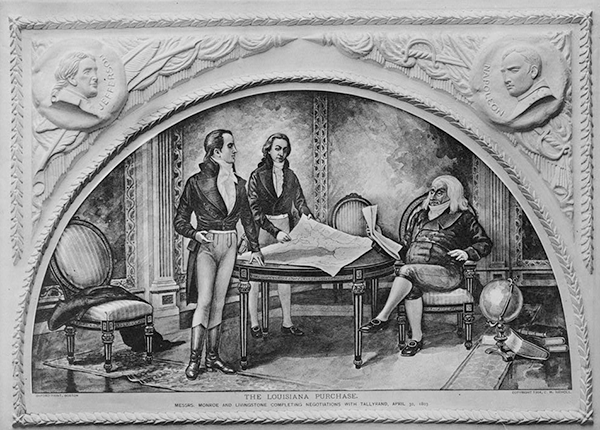Historic Document
The Louisiana Purchase, Treaty Between the United States of America and the French Republic (1803)
Robert Livingston, James Monroe and Barbé Marbois | 1803

Library of Congress, Prints and Photographs Division
Summary
Negotiated by the administration of Thomas Jefferson and ratified by Congress on October 20, 1803, the Louisiana Purchase Treaty roughly doubled the size of the United States. An enormous area stretching from the Gulf of Mexico to what is now the Canadian border, the land would ultimately be carved into fifteenth separate states, including Kansas, Nebraska, and Missouri. The addition of new lands opened up conflicts over the disposition of Native people’s claims to land and sovereignty in the territory as well as the issue of slavery. Whether these new states permitted or prohibited slavery would affect the precarious balance of power between slave state and free state under the original Constitution. The 1820 debates over the admission of Missouri resulted in a “compromise” whereby Missouri would be admitted as a slave state; but all future states carved out of the territory above the 36-30 line would be free. For the next forty years, the nation became increasingly divided over slavery and congressional power to ban slavery in the territories. In Dred Scott v. Sanford, Chief Justice Taney declared that the Missouri Compromise unconstitutionally denied slave owners of their property rights under the Fifth Amendment’s Due Process Clause. The adoption of the Thirteenth Amendment in 1865 ended the question of slavery in the territories. The Fourteenth Amendment transformed the treaty’s protection of the “rights, advantages and immunities of citizens of the United States” into the “privileges or immunities of citizens of the United States” which “no state shall” abridge.
Selected by

Laura F. Edwards
Class of 1921 Bicentennial Professor in the History of American Law and Liberty, and Professor of History at Princeton University

Kurt Lash
E. Claiborne Robins Distinguished Professor of Law at the University of Richmond
Document Excerpt
Article I
His Catholic Majesty promises and engages on his part to cede to the French Republic six months after the full and entire execution of the conditions and Stipulations herein relative to his Royal Highness the Duke of Parma, the Colony or Province of Louisiana with the Same extent that it now has in the hand of Spain, & that it had when France possessed it; and Such as it Should be after the Treaties subsequently entered into between Spain and other States.
. . .
Article II
The inhabitants of the ceded territory shall be incorporated in the Union of the United States and admitted as soon as possible according to the principles of the federal Constitution to the enjoyment of all these rights, advantages and immunities of citizens of the United States, and in the mean time they shall be maintained and protected in the free enjoyment of their liberty, property and the Religion which they profess.
. . .
Done at Paris the tenth day of Floreal in the eleventh year of the French Republic; and the 30th of April 1803.
Robt R Livingston [seal]
Jas. Monroe [seal]
Barbé Marbois [seal]




